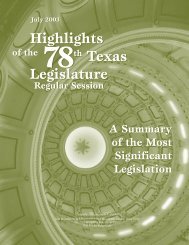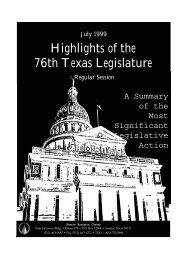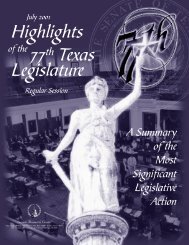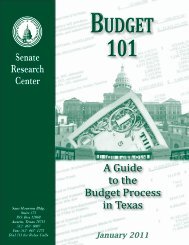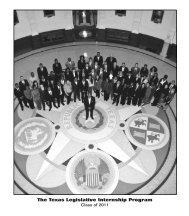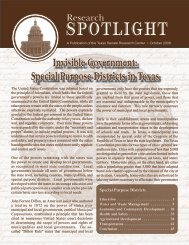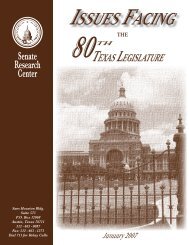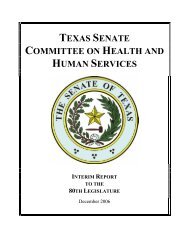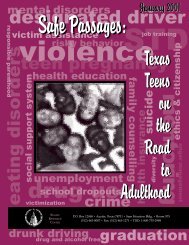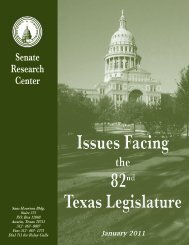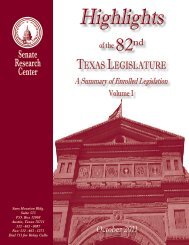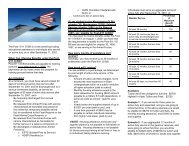Highlights of the 79th Texas Legislature - Senate
Highlights of the 79th Texas Legislature - Senate
Highlights of the 79th Texas Legislature - Senate
You also want an ePaper? Increase the reach of your titles
YUMPU automatically turns print PDFs into web optimized ePapers that Google loves.
EDUCATION/PUBLIC<br />
Security in Public Schools—S.B. 11<br />
By Senator Staples—House Sponsor: Representative Delisi<br />
Currently, <strong>the</strong>re are no statutory requirements for public schools to participate in emergency preparedness drills or<br />
training for school teachers and administrators. This bill:<br />
Requires each school district to adopt and implement a multi-hazard emergency operations plan that addresses<br />
mitigation, preparedness, response, and recovery as recommended by <strong>the</strong> commissioner <strong>of</strong> education in conjunction<br />
with <strong>the</strong> governor's <strong>of</strong>fice <strong>of</strong> homeland security for use in district schools.<br />
Requires a school district, at least once every three years, to conduct a security audit <strong>of</strong> <strong>the</strong> district's facilities using,<br />
to <strong>the</strong> extent possible, <strong>the</strong> security audit procedures developed by <strong>the</strong> <strong>Texas</strong> School Safety Center (center) or a<br />
comparable public or private entity.<br />
Requires a district to report <strong>the</strong> results <strong>of</strong> <strong>the</strong> security audit to <strong>the</strong> district's board <strong>of</strong> trustees.<br />
Requires <strong>the</strong> emergency plan to include a system for providing immediate notification to parents or guardians through<br />
a variety <strong>of</strong> communication methods in <strong>the</strong> event <strong>of</strong> an emergency.<br />
Requires <strong>the</strong> center to conduct a safety training program for school districts that includes assistance in developing a<br />
multi-hazard emergency operations plan for adoption.<br />
Requires <strong>the</strong> center to develop security criteria that school districts may consider in <strong>the</strong> design <strong>of</strong> instructional<br />
facilities.<br />
Requires a school district that constructs a new instructional facility or conducts a major renovation <strong>of</strong> an existing<br />
instructional facility using funds allotted to <strong>the</strong> district under this subchapter to consider, in <strong>the</strong> design <strong>of</strong> <strong>the</strong><br />
instructional facility, security criteria developed by <strong>the</strong> center.<br />
Requires <strong>the</strong> center, no later than December 1, 2005, to develop a school safety program that includes certain<br />
requirements and to develop certain security criteria.<br />
Requires each school district, no later than March 1, 2006, to adopt a multi-hazard emergency operations plan.<br />
Cooperation for Early Childhood Development—S.B. 23<br />
By Senator Zaffirini et al.—House Sponsors: Representatives Kolkhorst and Naishtat<br />
S.B. 76, 78th <strong>Legislature</strong>, Regular Session, 2003, permitted <strong>the</strong> State Center for Early Childhood Education to work<br />
with agencies in 11 model demonstration projects to integrate and coordinate prekindergarten, Head Start, child care,<br />
and after-school child care programs, and streamline eligibility and registration for those programs. Children in <strong>the</strong><br />
model programs have shown significant gains in language and literacy in short periods <strong>of</strong> time. This bill:<br />
Authorizes <strong>the</strong> commissioner <strong>of</strong> education to establish a program to provide incentives for early childhood education<br />
providers to coordinate services.<br />
Allows governmental entities and community organizations in a coordination-<strong>of</strong>-resources demonstration project to<br />
include early childhood education providers, such as Head Start and Early Head Start, prekindergarten, and afterschool<br />
child-care program services, child-care services provided by nonpr<strong>of</strong>it or for-pr<strong>of</strong>it entities, and faith-based<br />
child-care programs.<br />
HIGHLIGHTS - 79 TH TEXAS LEGISLATURE 77



